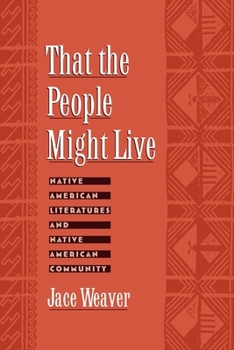That the People Might Live: Native American Literatures and Native American Community
Select Format
Select Condition 
Book Overview
Loyalty to the community is the highest value in Native American cultures. Taking his sense of community as both a starting point and a lens, this book offers fascinating discussions of Native American written literature. Drawing upon the best of Native and non-Native scholarship, the author adds his own provocative thoughts and eloquent writing to help readers to a richer understanding of these too often neglected texts.
Format:Paperback
Language:English
ISBN:019512037X
ISBN13:9780195120370
Release Date:December 1997
Publisher:Oxford University Press
Length:256 Pages
Weight:0.85 lbs.
Dimensions:0.6" x 6.1" x 9.1"
Customer Reviews
1 rating
Some Basic Truths
Published by Thriftbooks.com User , 25 years ago
Jace Weaver's contribution to Native American Literary criticism is monumental. The introduction to So That The People Might Live is not only informative but also pushes, explores, and expands upon what scholarly information is currently available regarding Native American writers and their literary contributions. Mr. Weaver speaks about some basic truths regarding Native American communities and these communities' connections to a Native American author's writing. Essentially he says "I am We"--A native person's sense of identity and/or responsibility toward writing, anything, is wrapped up in that persons individual as well as communal identity. Although an author may be writing as an individual s/he is always aware of his/her greater identity.The chapters that follow Mr. Weaver's introduction rehash some familiar ground but his information and diligent research is apparant and is, to a great extent, relevent as well as illuminating. All in all this book is definately worth the read and the buy for those who are serious about Native American Literature.






